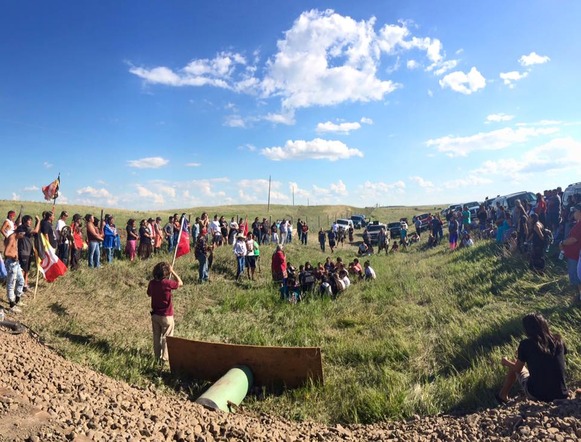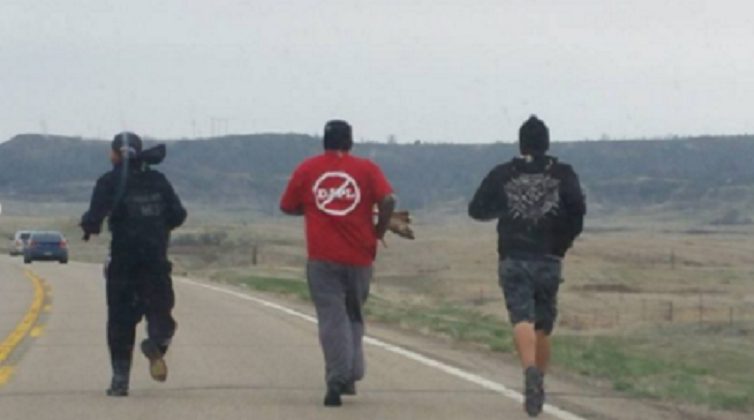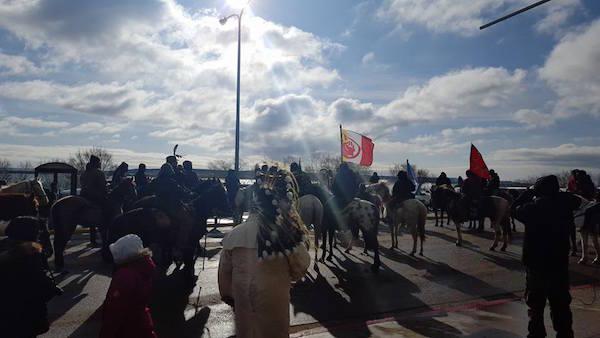
Standing Rock Sioux Tribe and IITC file an Urgent Communication to the United Nations Citing Human Rights Violations Resulting from Pipeline Construction
Featured image: Dakota Access Pipeline Protest In North Dakota. Photo Credit: “No Dakota Access in Treaty Territory – Camp of the Sacred Stones”
By International lndian Treaty Council
Ft. Yates, North Dakota, United States: On Thursday, August 18, 2016 the Standing Rock Sioux Tribe and the International Indian Treaty Council (IITC) jointly submitted an urgent action communication to four United Nations (UN) human rights Special Rapporteurs. It cited grave human rights and Treaty violations resulting from the construction of the Dakota Access crude oil pipeline in close proximity to the Standing Rock Reservation by the United States Army Corps of Engineers and Dakota Access LLC, a subsidiary of Texas-based Energy Transfer.
The Standing Rock Sioux Tribe (SRST) stands in firm opposition to the Dakota Access Pipeline. The pipeline would carry nearly half a billion barrels of crude oil a day, and would cross the Missouri River threatening the Tribe’s main water source and sacred places along its path including burials sites. The urgent communication was submitted to UN Special Rapporteurs on the situation of human rights defenders; the Rights of Indigenous Peoples; the human right to safe drinking water and sanitation; and Environment and Human Rights, as well as the Office of the UN High Commissioner for Human Rights. It requests that they urge the United States to halt the human rights violations and uphold its human rights and Treaty obligations to the Standing Rock Tribe. It was also forwarded to key officials in the U.S. State Department, Department of Interior and the White House.
The urgent communication focuses on violations of the UN Declaration on the Rights of Indigenous Peoples, the 1868 Ft. Laramie Treaty and other International human rights standards to which the United States is obligated. It also cites actions against human rights defenders, including arrests and other forms of intimidation, violations of the human right to water, and lack of redress and response using domestic remedies. The submission noted that this action violates Article 32 of the UN Declaration on the Rights of Indigenous Peoples, which affirms the obligation of States to obtain Indigenous Peoples’ free prior and informed consent before development projects affecting their lands, territories or other resources are carried out. The Lakota and Dakota, which includes the SRST, were part of the Sovereign Sioux Nation, which concluded the 1868 Ft. Laramie Treaty with the United States. The United States has legally-binding obligations based on this Treaty to obtain the Lakota and Dakota’s consent before activities are carried out on their Treaty lands.
The urgent communication also highlights environmental racism in violation of the International Convention on the Elimination of all Forms of Racial Discrimination Convention (ICERD) to which the US is legally obligated. It notes that the United States has permitted Energy Transfer to divert the pipeline’s route from near the mainly non-Indigenous population of Bismarck, ND to disproportionately impact the SRST.
A primary concern expressed by the Tribe is potential devastating effects on its primary water source. SRST Chairman Dave Archambault II, who was among those arrested and is also being sued by the company for obstructing the pipeline’s construction, stated on August 15th “I am here to advise anyone that will listen, that the Dakota Access Pipeline is harmful. It will not be just harmful to my people but its intent and construction will harm the water in the Missouri River, which is the only clean and safe river tributary left in the United States.”
In response to the Tribe’s opposition, Dakota Access LLC, the developers of the $3.8 billion, four-state oil pipeline, has waged a concerted campaign to criminalize and intimidate Tribal leaders, Tribal members and their supporters who have consistently been peaceful and non-violent. The IITC and SRST are calling upon the UN Rapporteur on Human Rights Defenders to call upon the United States to immediately cease all arrests and other forms of intimidation, drop any pending lawsuits, and ensure that all legal charges against these human and Treaty Rights defenders be lifted. The urgent action communication cited this case as an example of the criminalization of Indigenous human rights defenders around the world, as noted by various UN bodies.
Despite 28 arrests reported to date, the peaceful protesters have succeeded in temporarily halting the pipeline’s construction. A hearing is currently scheduled for next week in federal court to consider the Tribe’s request for an injunction. Construction has reportedly been halted until the hearing, providing an important initial victory for the Tribe and their supporters.
The joint urgent UN communication requests the intervention of these UN human rights mandate holders to call upon the United States to uphold its statutory, legal, Treaty and human rights obligations and impose an immediate and ongoing moratorium on all pipeline construction until the Treaty and human rights of the Standing Rock Sioux Tribe, including their right to free prior and informed consent, can be ensured.
Editor’s note: for more current news on the Dakota Access Pipeline, see U.S. Government Bans Native American Tribe From Protesting On Their Own Land – Send In Police To Remove Protesters and Dalrymple signs emergency declaration to manage public safety at Dakota Access Pipeline protest near Cannon Ball


